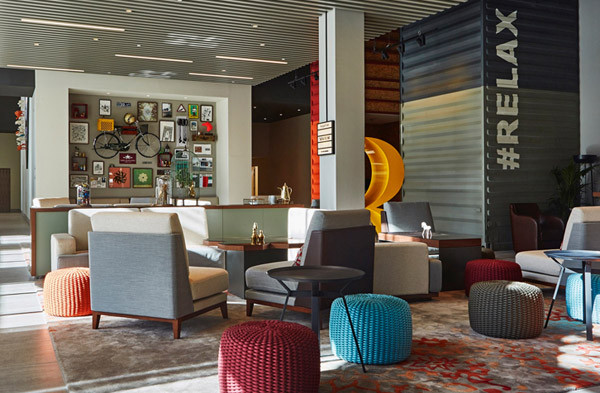✕

Column: industry Tag: Emaar,Emaar Hospitality,Emaar Properties Published: 2017-06-14 16:18 Source: Author:

Emaar Hospitality Group’s Rove Downtown is one of three Rove assets, currently all located in Dubai, that the development and management firm deems “contemporary midscale.” (Photo: Emaar Hospitality)
DUBAI, United Arab Emirates—Emaar Hospitality Group will continue adding to its Dubai and United Arab Emirates portfolio in the run-up to Dubai Expo 2020 but also plans expansion into Europe, India and China, according to sources.
Owned by publicly traded developer Emaar Properties, Emaar Hospitality has begun to develop three hotel brands: The Address Hotels + Resorts, in what it terms the “premium” category; “upscale lifestyle” Vida Hotels & Resorts, and “contemporary midscale” Rove Hotels.
Olivier Harnisch, CEO of Emaar Hospitality—which also oversees Emaar Properties’ leisure initiatives—said his role is to manage mixed-use property developments and a diversified portfolio of assets, including hotels, serviced residences, golf clubs, a polo club, a marina and restaurants.
Emaar Properties has three core businesses, Harnisch said, to “create premium real estate such as the iconic Burj Khalifa, malls and leisure through developments such as The Dubai Mall, and hospitality.”
Emaar Hospitality also is changing its business model, which Harnisch said was maturation in step with the UAE’s tourism and hospitality offerings.
Last month, the company announced a new agreement strategy, tying incentive fees to profits, not revenue.
“The agreement has two main advantages,” Harnisch said. “It aligns interest of owners and operator to optimize profit by enhancing profitable revenues and keeping costs under control, (and) there is a much closer share of gain and pain between owner and operator as owner profit and operator fees correlate perfectly.”
Flexibility
Harnisch said Emaar is the first international hotel operating company with such incentive fee-only management agreements.
The point is not lost on Harnisch that owners might complain there is a disconnect between the fees charged by brands on top-line revenue and the profits owners see on bottom-line revenues, and that there is no incentive for operators to bridge the gap.
“We are committed to long-term value creation for our stakeholders,” Harnisch said. “Ultimately, it is profit that owners use to repay their loans and reward their shareholders. We feel that profit is a much more powerful indicator of success than revenue. It is fair for an operator to be remunerated on the basis of the profit they generate for the owner without the added safety net of the base fee, which is linked to revenue and totally independent of profit.”
Harnisch said this structure is a response to the evolution of the hospitality industry.
“The distribution landscape and the cost of distribution have fundamentally changed over the past years, and we feel that the new model takes this into account,” he said. “We are leveraging our experience both as a hotel owner and operator in developing the new model—positioning us as an industry leader with a unique focus on every individual owner’s need. In essence, we think like an owner.”
Harnisch added that the new agreements fall into Emaar’s mandate of being as flexible as possible in order to meet specific owner needs and strategies and to better compensate owners other than just the good times. He added he has already received numerous inquiries concerning the new format.
“Some agreements are longer, for that extra bit of yield. … And we do not expect to earn any less money,” he said. “We see this flexibility providing us with additional yield.”
Strength in bricks, numbers
Dubai’s construction industry is dominated by a small handful of large players, Emaar Properties among them. Others include Aldar Properties, DAMAC Properties and Deyaar.
Emaar and Meraas, which has four brands under its hotels division established in late 2015, are the only ones among those that have also moved into hotel ownership and management. Emaar also intends to expand out of the Middle East, according to Jaidev Menezes, Emaar Hospitality’s corporate director of business development.
But first, Emaar will cement its position in its core markets, Menezes said.
“We currently have three Roves, with two more in the pipeline and to open by the end of 2017,” he said. “That number will be 10 by 2020, a total of 3,600 rooms in Dubai.”
While Rove is one of Emaar’s top hotel development priorities, Menezes said the company will still diversify its real estate. Emaar’s portfolio includes the towering Burj Khalifa, the world’s tallest building that contains offices, residences and the Armani Hotels Dubai, which is also managed by Emaar under its hotels and resorts division.
“We propose a lot of success for Rove, developing the product, not just operating it, but the model is not to be in a race,” he said. “Strength will come from building iconic assets.”
In April, Emaar announced six new properties under its Address and Vida Hotels & Resorts brands in Abu Dhabi, Dubai and Egypt. Currently, Address has five hotels in operation, Vida has one, but the pipeline in place for all three brands is now 26, Menezes said.
Harnisch said the plan was to expand into markets including Egypt, Turkey, Saudi Arabia and Bahrain through hotel management contracts and also as part of Emaar’s master developments.
“We also aim to expand our distinctive brands to the key gateway cities of Europe, India and China, which adds to our exciting journey,” Harnisch said.
Previous:Hilton Abu Dhabi Yas Island Resort Announced for 2019
Next:Hotel execs share on state of industry, need for scale
Hot key words
Hot Products
Popular Vendors